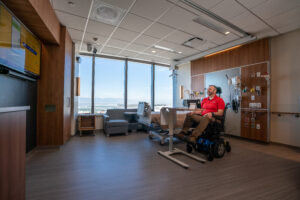Providing Independence Through Technology

Following a spinal cord injury, there is urgency to find quality treatment, compassionate care, and emotional support. Fortunately, across the country, there are facilities dedicated to meeting this need. However, patients with complex injuries aren’t typically the first consideration when it comes to the design of a hospital room, where individuals with a spinal cord injury (SCI) will remain during a critical time in their recovery. With the incredible growth of technology and the advances of accessibility, a hospital room can be designed around the touch of a button.
In the last five years, the Neilsen Foundation has seen a large uptick in grant applications requesting support for in-hospital technology upgrades from portable devices to rethinking how people’s needs are met. With the creative ideas our grantee partners are presenting, building a hospital room that can be controlled by a patient gives an individual independence at a time in their lives when they might feel that everything is out of their control. This can be an important step to recovery.
In 2020, the University of Utah opened the Craig H. Neilsen Rehabilitation Hospital. This state-of-the-art facility was designed to be fully accessible with a one-touch and voice-controlled system that extended throughout the hospital (see photograph). This technology creates an environment that is easier for patients and their families, as well as staff, and adds little to no cost when incorporated into a building’s initial architectural design. There are other medical and rehab centers around the country with newer facilities, like the Shirley Ryan AbilityLab in Chicago and the University of Miami, which have also created a more accessible space for individuals with SCI.
“I see the ease with which people flow through the space,” Jeff Rosenbluth, the Medical Director of the University of Utah’s Spinal Cord Injury Acute Rehabilitation program, explains of the Craig H. Neilsen Rehabilitation Hospital. “I don’t think people understand how embarrassed patients are to call the nurses back and forth to close a door, change the channel on the TV or turn the volume up and down, or fix the blinds. They don’t want to feel that dependent. They don’t want to bother you… I’m impressed how big of a deal it is to control simple things in your life.”
The technology is also helping to provide hope and healing for young patients with SCI at Phoenix Children’s Hospital in Arizona. The Neilsen Foundation supported the purchase of an assistive technology device that allows users to control aspects of an adaptive hospital room, including bed positioning and height, nurse call, computer access, and zone lighting all with a voice command or one-touch interface.
Technology can also improve accessibility once people leave the hospital, so our grantee partners are working to make sure individuals with SCI have the ability to modify their homes with some of the same tools they had access to during their early weeks of recovery. The Center for Independent Living of Broward, Florida has renovated homes and installed smart technology devices such as automated door openers, thermostats, and even electrical outlets. Similarly, engineers at MultiCare Foundations are developing an Assistive Technologies Lab that will provide outpatients with access to devices, so they can test them at home to maximize independent living.
We are inspired by how our grantee partners are using technology to make huge strides for the wellbeing of people living with SCI. By harnessing these tools and being thoughtful about how to use them to our advantage, barriers we once thought were insurmountable are being removed. Putting the needs of people first, thinking creatively about how to integrate technology, rehabilitation, and independent living, we look forward to seeing what’s coming next.